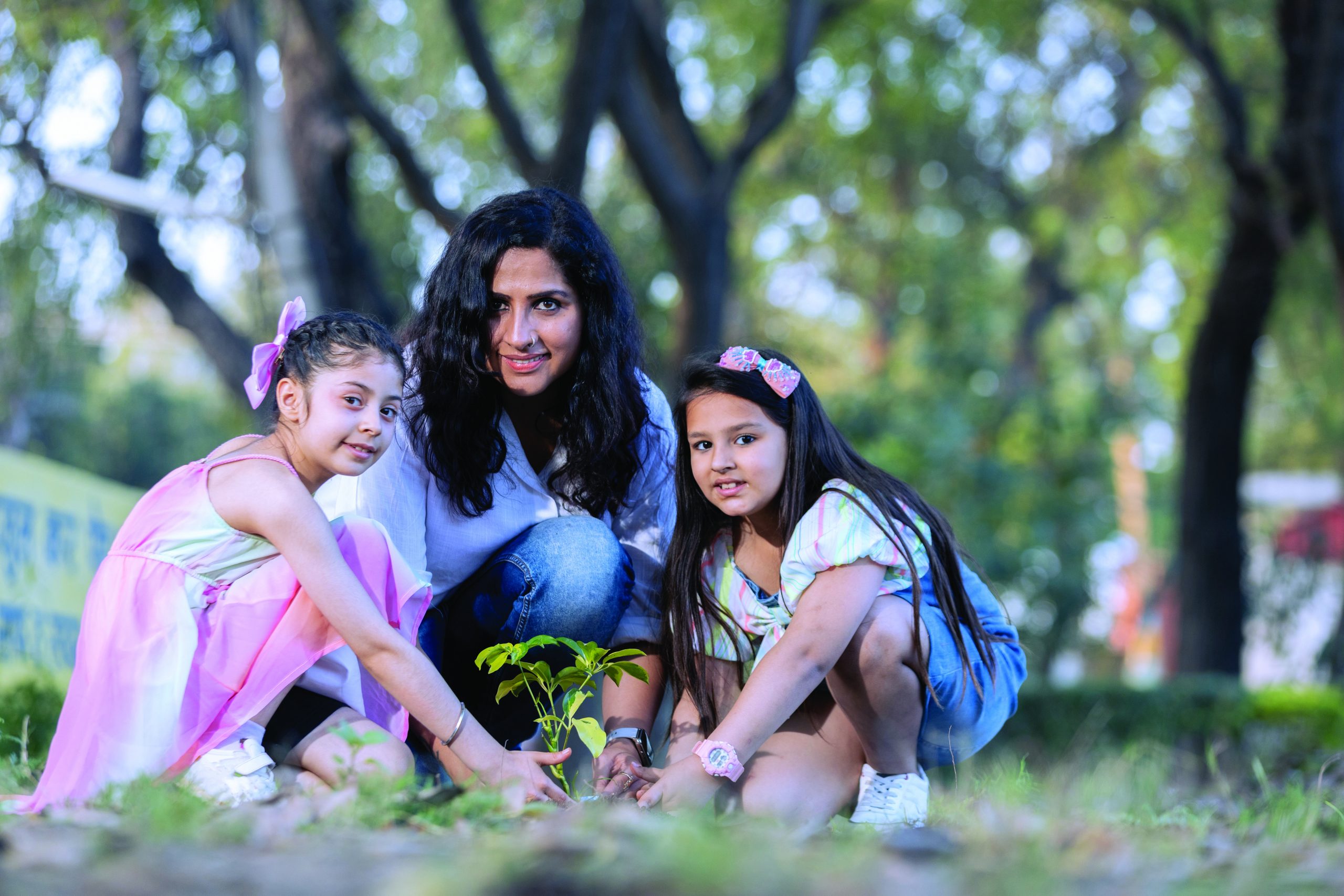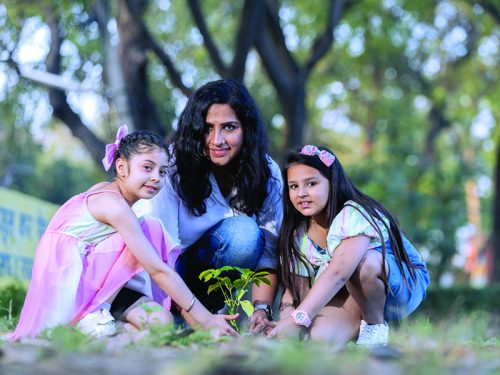Raising children to practice sustainable living
There’s a rising consensus among educators and green activists that it’s also important for families and households to adopt sustainable living practices to protect the next generation from the impending environmental disaster that’s looming ahead writes Kiran Balimane, Mini P. & Cynthia John

At the COP28 Meeting — the 28th United Nations (UN) climate meeting — which recently concluded (December 12) in Dubai, world leaders (including Prime Minister Narendra Modi) representing 200 countries discussed the catastrophic impact of climate change on Planet Earth, how to mitigate it and prepare for the future. For the first time, all countries agreed on the need to “transition away from fossil fuels in energy systems”, reduce carbon emissions and approved a climate disaster “loss and damage fund” to aid vulnerable communities and developing nations most heavily hit by climate disasters. However, the ‘agreement’ doesn’t compel countries to take specified action and no timeline was set.
The COP28 Meeting was held against the backdrop of scientists confirming that 2023 was the hottest year ever experienced by Planet Earth with average temperature rising by 1.5oC. There is rising panic around the world that Planet Earth is inexorably gravitating towards an unprecedented environmental crisis. Global warming, climate change, destruction of natural habitats of wildlife and plants, air and water pollution, rising sea water levels due to meltdown of polar ice caps, are slowly but surely destroying environments around the world and threatening humankind leaving children in particular, staring at a bleak future.
India, that is Bharat with its large population heavily reliant on fossil fuels, and under-educated citizens is among the worst hit countries. According to a recent report of the Centre for Science and Environment (CSE), three Indian metros — Delhi, Mumbai, and Kolkata — are ranked among the world’s Top 10 most polluted cities. Another report of the NITI Aayog — the Union government’s thinktank — reveals that 21 metros including Delhi, Bengaluru, Chennai, and Hyderabad, are experiencing a severe water crisis due to overexploitation of ground water, pollution, and climate change, and are expected to run out of groundwater by 2025 which will directly hit 100 million citizens. A study of the Central Pollution Control Board (CPCB) highlights that only 22 of 51 urban cities countrywide have functional solid waste management systems.
Even as governments are doing their bit at the macro level to limit the impact of an environmental crisis threatening Planet Earth, there’s a rising consensus among educators and green activists that it’s also important for families and households to adopt sustainable living practices to protect children from the impending environmental disaster that’s looming ahead.
“The global environmental crisis is real with climate change, dwindling natural resources and toxic air pollution casting a dark and deep shadow over the future of our children. In the circumstances, it’s the duty of all parents to start actively contributing towards limiting environmental damage by adopting sustainable living practices. Sustainable living is way past being a fashionable trend, it’s become a necessity. Parents need to educate children that sustainable living is about appreciating, valuing, and being mindful about our world, people around us, and maintaining harmony and balance within our environment. Children have a natural acumen for sustainable living. Parents need to nurture children’s inherent affinity to nature and motivate them to adopt more sustainable lifestyles,” says Meenakshi Gupta, co-founder, Goonj, an NGO “working to build a bridge between cities and villages”.
Gupta, also a board member of Catalyst 2030, a global community of social entrepreneurs, says that families can embrace green living through simple activities such as planting a tree together, getting involved in local environmental initiatives and movements (see box p.12).
PW interviewed environment experts to suggest simple sustainable living practices in the areas of nutrition, waste management, energy use, transportation and water conservation.
Sustainable nutrition
The Ireland-based Kerry Health & Nutrition Institute defines sustainable nutrition as “the ability of food systems to provide sufficient energy and essential nutrients to maintain good health of the population without compromising the ability of future generations to meet their nutritional needs”. In short, nutrition/food that is produced and delivered in ways that don’t damage other people, the environment and society.
“Sustainable nutrition essentially means that people should make food growing, buying and consumption decisions that don’t harm the environment. There are many simple ways parents can practice sustainable nutrition at home,” says Mahima Sethia, a Delhi-based nutritionist, lifestyle coach, and founder of Fitness Flu, a holistic wellness company.
Sethia’s sustainable nutrition guidelines:
- Choose to buy fruits, vegetables and food products that use minimal chemicals and pesticides, conserve water, and promote biodiversity.
- Reduce food waste at every stage from preparation to consumption.
- Store foods safely to extend their life and reduce wastage.
- Switch to sustainable diets comprising whole grains, vegetables, nuts, fruits and less processed food.
- Support local farmers and agriculture by buying local seasonal foods to reduce the carbon footprint.
- Use upcycled shopping bags/reusable totes for grocery shopping. Banish plastic bags from the home.
- Make shopping lists carefully, purchasing only what’s needed to avoid wastage. Also shop mindfully, reading labels to understand ingredients used and production details.
- Include local unprocessed foods such as legumes, peas, nutritional yeast, beans, and mushrooms (rich in protein); nuts and seeds (fat) and millets and other whole grains (carbohydrates) in family diets.
- Encourage children to eat mindfully while reflecting on the origins of the food and its impact on the environment.
Energy efficiency
There are numerous ways to save energy at home and reduce your carbon footprint. PW’s six-point guidelines:
- Switch to LED lights. Many homes are moving towards smart LED lights which are not only more affordable but also more efficient than halogen bulbs.
- Idle electronic gadgets consume energy even when switched off, so unplug home appliances, phone chargers and digital devices.
- Avoid usage of air conditioners unless necessary. Or adjust air conditioner temperature to comfortable levels.
- Explore solar power options for your home energy needs. Long term, this can hugely reduce energy bills and usage of carbon-emitting thermal power.
- Teach children to turn off the lights when leaving a room. Lead by example.
- Switch to energy-efficient appliances. Dryers and refrigerators are two of the most energy-intensive appliances. By replacing these with more efficient models you can reduce electricity usage by half and reduce usage of thermal power.
Waste management
India generates 62 million tonnes of waste annually, with 70 percent collected, and only 12 million tonnes treated, while 31 million tonnes end up in landfills. Household waste is a major contributor to the total waste mound. Here are some small but effective ways in which you can practice sustainable waste management at home:
- Avoid single-use plastic which is indestructible and chokes rivers, lakes and oceans. Carry reusable bags for shopping and choose package-free products.
- Don’t use throw-away plastic water bottles; instead, carry your own reusable water bottles. Support movements in favour of banning plastic straws. Drink directly from glasses.
- Reduce the use of paper. Use dish cloths instead of paper towels in the kitchen. Switch to using handkerchiefs instead of tissues. For picnics, use eco-friendly bamboo jute plates and cutlery instead of paper plates.
- Compost kitchen waste/food scraps, which can be used as fertiliser for your garden/plants.
- Segregate household waste into dry and wet categories. This facilitates efficient recycling.
- Support local composting initiatives and waste reduction campaigns in your neighbourhood.
Sustainable transportation
Vehicular pollution is a major contributor to air pollution. In 2023, an estimated 21.2 million vehicles were sold in India. When a vehicle burns gasoline, it emits pollutants into the air which is as harmful as smoking 10 cigarettes a day. A guide to practising sustainable transportation:
- Opt to walk or cycle for short distances to reduce gasoline consumption. Also use public transport which reduces individual carbon footprints.
- Make an effort to carpool. When going to school or work, try to carpool with other people headed in the same direction. You can save money and reduce the amount of fuel burned.
- If considering buying a car, opt for clean energy electric vehicles.
- Support better public transport and cycling facilities in your city.
- Poorly maintained cars emit higher amounts of gasoline pollutants. Therefore, pay attention to maintaining conventional gasoline vehicles. This will result in lesser emissions.
- Turning off car engines at traffic stoplights will reduce emissions while idling.
Water conservation
A 2019 NITI Aayog report highlights that India is suffering from the worst water crisis in its history, and almost 600 million people are water-deprived. It estimates that by 2025 — next year — India will become a water scarce nation. Against this depressing backdrop, water conservation should not be merely the government’s responsibility but also of households. PW’s recommendations:
- Teach children to turn off water taps when they brush their teeth or soap hands.
- Teach all family members to turn off the shower while they soap up or shampoo their hair and then turn on again to rinse.
- Water your garden during the coolest part of the day. If you do it in the heat of the sun some water evaporates before the plants get a chance to absorb it.
- Fix leaking taps, shower heads, toilets, and hoses without delay.
- Use leftover drinking water to water house plants instead of tipping it down the sink.
- Install a rainwater tank. This water can be re-used for watering the garden or washing motor cars.
- Install water-efficient appliances.
Teaching children sustainability
Meenakshi Gupta, co-founder, Goonj, a Delhi-based NGO, suggests some simple ways to instill sustainable living culture in children:
- Teach children gratitude for the people in their lives and what they have. Encourage discussions on how they can give back to the world in acknowledgment of ordinary privileges — tap water, cooking gas and electricity — they enjoy daily.
- Integrate nature into their lives. Highlight how nature takes only what it needs, promoting an understanding of sustainable resource use and eliminating hoarding.
- Cultivate mindfulness and responsibility in their daily lives, such as making sustainable living choices about their food and shopping.
- Establish rituals that contribute positively to their immediate environments — engaging in acts of kindness, participating in waste management community projects and carbon reduction campaigns.
- Expose children to the work of various non-profit organisations addressing diverse social issues. Inspire them with stories, reports, documentaries, and examples of children who have contributed creatively towards solving environment problems.
- Initiate regular family discussions on making sustainable living choices, whether it’s considering purchase of a (more expensive) electric car or choosing to support local artisans over big brands. Children learn best when they observe their parents consistently embodying the values of sustainable living and environment preservation practices in their daily lives.
Enjoyable sustainable living activities for children
Here are 10 hands-on activities you could use to teach children about sustainable and environment friendly lifestyles:
Reducing, reusing and recycling. One of the first precepts of sustainable living is to teach children the three R’s — reduce, reuse and recycle. Create projects or implement family practices to show them how to reduce consumption, reuse and recycle products.
Grow your own food in a garden. An enjoyable activity that leads to bountiful results is planting a garden at home. This will teach children how to supplement consumption by growing fruits and vegetables.
Create a compost bin. Instead of throwing all your food scraps away, compost them to make rich fertiliser for your garden. It is also an excellent hands-on science activity for children.
Repurpose and upcycle objects for crafts. Put your reduce, reuse and recycle lesson into action through art and craft activities. To make innovative crafts, you could use everyday objects such as
- Milk jugs
- Tissue boxes
- Glass jars
- Paper towel rolls
Visit a recycling centre. Make a trip to a recycling center to show children how to reuse waste materials. They can learn about the recycling process, how waste and throw-away materials are sorted, cleaned and prepared for usage in new finished products.
Take a camping trip for a vacation. Camping is an excellent and sustainable holiday choice. Spend time in nature with limited use of gasoline driven vehicles.
Go on nature walks and hikes. You could take advantage of your walks and hikes by talking about how contemporary lifestyles damage nature and what steps we can take in our daily lives to reduce environmental damage.
Turn picking up trash into a game. When out shopping or during nature walks, take a bag with you to gather litter. You could turn ‘plogging’ into a game with your children and reward those who collect the most trash.
Read about environment sustainability together. Choose age-appropriate books that focus on protecting the environment and mitigating the effects of climate change. There are many children’s books that teach sustainable living.
Volunteer for eco-friendly activities. Encourage children to volunteer for environment improvement activities. Together with them, you could volunteer for cleaning up beaches, plant trees or work with animal rescue teams.
(Source: www.koa.com)

















Add comment